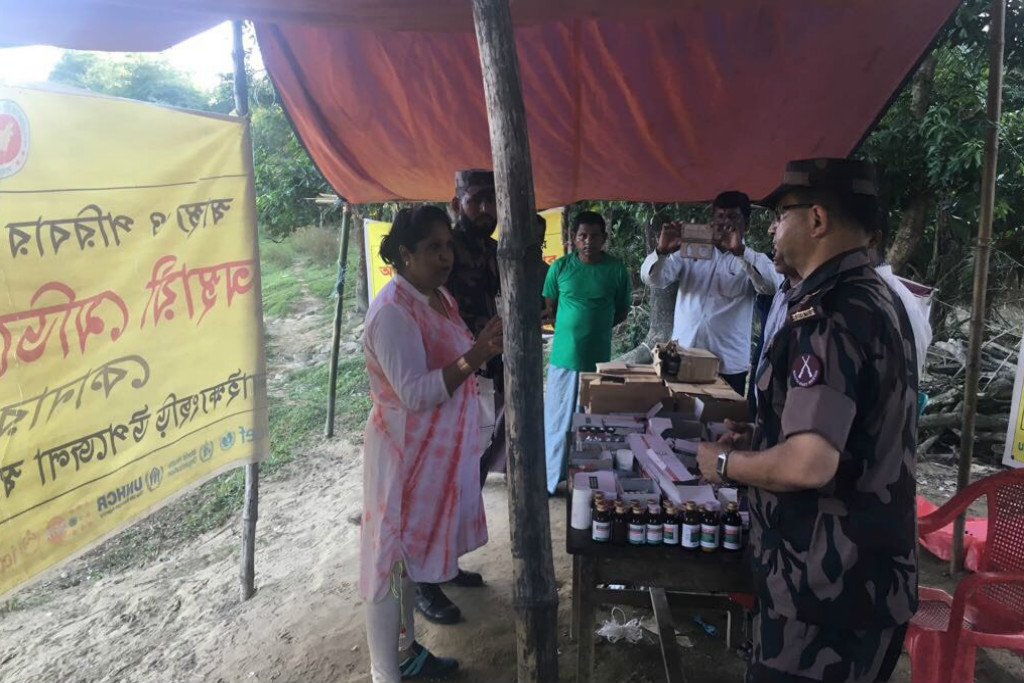UN Envoy Urges Greater Support for Rohingya Victims of Sexual Violence
ASIA--PACIFIC, UNITED NATIONS, 20 Nov 2017
UN News Centre – TRANSCEND Media Service
16 Nov 2017 – Following a visit to Bangladesh’s Cox’s Bazar, where hundreds of thousands of Rohingya refugees from Myanmar have settled in makeshift camps, a United Nations envoy has called for enhanced measures to protect and assist victims of sexual violence among the displaced population.
“My observations point to a pattern of widespread atrocities, including rape, gang-rape by multiple soldiers, forced public nudity and humiliation, and sexual slavery in military captivity directed against Rohingya women and girls,” UN Special Representative on Sexual Violence in Conflict Pramila Patten said today.
The humanitarian crisis caused by escalating violence in Myanmar’s Rakhine state is causing catastrophic suffering. Over 600,000 Rohingya refugees have fled across the border to Bangladesh since 25 August. The UN Office for Coordination of Humanitarian Affairs (OCHA) estimates Bangladesh now hosts more than 800,000 Rohingya refugees.
Ms. Pattan’s visit, mainly to Bangladesh’s capital, Dhaka, and to Cox’s Bazar, from 5 to 13 November, was to better understand the nature, patterns and trends of sexual violence related to the conflict in Myanmar and also to assess options for providing support to the Government of Bangladesh, the UN system and other partners to ensure that the rights of conflict-affected women and girls are respected and upheld in the settlements.
“A clear picture is also emerging of the alleged perpetrators of these atrocities and their modus operandi. Sexual violence is allegedly being commanded, orchestrated and perpetrated by the Armed Forces of Myanmar, otherwise known as the Tatmadaw,” she said.

UN Special Representative on Sexual Violence in Conflict Pramila Patten at a government health post in Konapara, Bangladesh, during a visit that also included Cox’s Bazar.
Photo: Office of the Special Representative
Other actors allegedly involved include the Myanmar Border Guard Police and militias composed of Rakhine state Buddhists and other ethnic groups, she added.
The release said that her Office has agreed with the Government of Bangladesh to develop a framework of cooperation, focusing particularly on the documentation, training, capacity-building, and strengthening of sexual and gender-based violence services and programmes.
Bangladesh is also in the process of developing a national action plan on women, peace and security, which is an important entry-point for action to address conflict-related sexual violence and other human rights violations against Rohingya women and girls.
However, national institutions and communities in the settlement areas are stretched to the limits of their capacity, to provide the basics of shelter, food, water and primary health care.
In terms of sexual and gender-based violence programmes, there is an acute funding shortfall of more than $10 million for the next three months to deliver essential services, including clinical case management, community outreach, awareness-raising and the distribution of dignity kits, which contain clothing and sanitary items.
“The international community must come together to support the Government of Bangladesh to address this vast humanitarian and protection crisis,” she urged.
All of the women she spoke with wanted the perpetrators to be brought to justice, and to ensure that these atrocities would never repeat, she said.
“Such words must serve as our moral compass as we chart the way towards a durable solution that respects the human rights and human dignity of a community that has been called ‘the most persecuted people on earth,’” she said.
DISCLAIMER: The statements, views and opinions expressed in pieces republished here are solely those of the authors and do not necessarily represent those of TMS. In accordance with title 17 U.S.C. section 107, this material is distributed without profit to those who have expressed a prior interest in receiving the included information for research and educational purposes. TMS has no affiliation whatsoever with the originator of this article nor is TMS endorsed or sponsored by the originator. “GO TO ORIGINAL” links are provided as a convenience to our readers and allow for verification of authenticity. However, as originating pages are often updated by their originating host sites, the versions posted may not match the versions our readers view when clicking the “GO TO ORIGINAL” links. This site contains copyrighted material the use of which has not always been specifically authorized by the copyright owner. We are making such material available in our efforts to advance understanding of environmental, political, human rights, economic, democracy, scientific, and social justice issues, etc. We believe this constitutes a ‘fair use’ of any such copyrighted material as provided for in section 107 of the US Copyright Law. In accordance with Title 17 U.S.C. Section 107, the material on this site is distributed without profit to those who have expressed a prior interest in receiving the included information for research and educational purposes. For more information go to: http://www.law.cornell.edu/uscode/17/107.shtml. If you wish to use copyrighted material from this site for purposes of your own that go beyond ‘fair use’, you must obtain permission from the copyright owner.
Read more
Click here to go to the current weekly digest or pick another article:
ASIA--PACIFIC:
- The Hawaiians Who Want Their Nation Back
- The Hidden Meaning of the Martial Law in South Korea
- The Machu Picchu Declaration of the Asia-Pacific Economic Cooperation-APEC 2024
UNITED NATIONS: